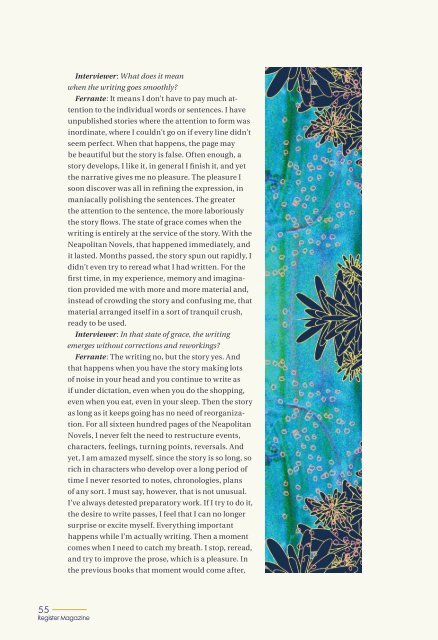magazine_final_online
Create successful ePaper yourself
Turn your PDF publications into a flip-book with our unique Google optimized e-Paper software.
Interviewer: What does it mean<br />
when the writing goes smoothly?<br />
Ferrante: It means I don’t have to pay much attention<br />
to the individual words or sentences. I have<br />
unpublished stories where the attention to form was<br />
inordinate, where I couldn’t go on if every line didn’t<br />
seem perfect. When that happens, the page may<br />
be beautiful but the story is false. Often enough, a<br />
story develops, I like it, in general I finish it, and yet<br />
the narrative gives me no pleasure. The pleasure I<br />
soon discover was all in refining the expression, in<br />
maniacally polishing the sentences. The greater<br />
the attention to the sentence, the more laboriously<br />
the story flows. The state of grace comes when the<br />
writing is entirely at the service of the story. With the<br />
Neapolitan Novels, that happened immediately, and<br />
it lasted. Months passed, the story spun out rapidly, I<br />
didn’t even try to reread what I had written. For the<br />
first time, in my experience, memory and imagination<br />
provided me with more and more material and,<br />
instead of crowding the story and confusing me, that<br />
material arranged itself in a sort of tranquil crush,<br />
ready to be used.<br />
Interviewer: In that state of grace, the writing<br />
emerges without corrections and reworkings?<br />
Ferrante: The writing no, but the story yes. And<br />
that happens when you have the story making lots<br />
of noise in your head and you continue to write as<br />
if under dictation, even when you do the shopping,<br />
even when you eat, even in your sleep. Then the story<br />
as long as it keeps going has no need of reorganization.<br />
For all sixteen hundred pages of the Neapolitan<br />
Novels, I never felt the need to restructure events,<br />
characters, feelings, turning points, reversals. And<br />
yet, I am amazed myself, since the story is so long, so<br />
rich in characters who develop over a long period of<br />
time I never resorted to notes, chronologies, plans<br />
of any sort. I must say, however, that is not unusual.<br />
I’ve always detested preparatory work. If I try to do it,<br />
the desire to write passes, I feel that I can no longer<br />
surprise or excite myself. Everything important<br />
happens while I’m actually writing. Then a moment<br />
comes when I need to catch my breath. I stop, reread,<br />
and try to improve the prose, which is a pleasure. In<br />
the previous books that moment would come after,<br />
55<br />
Register Magazine


